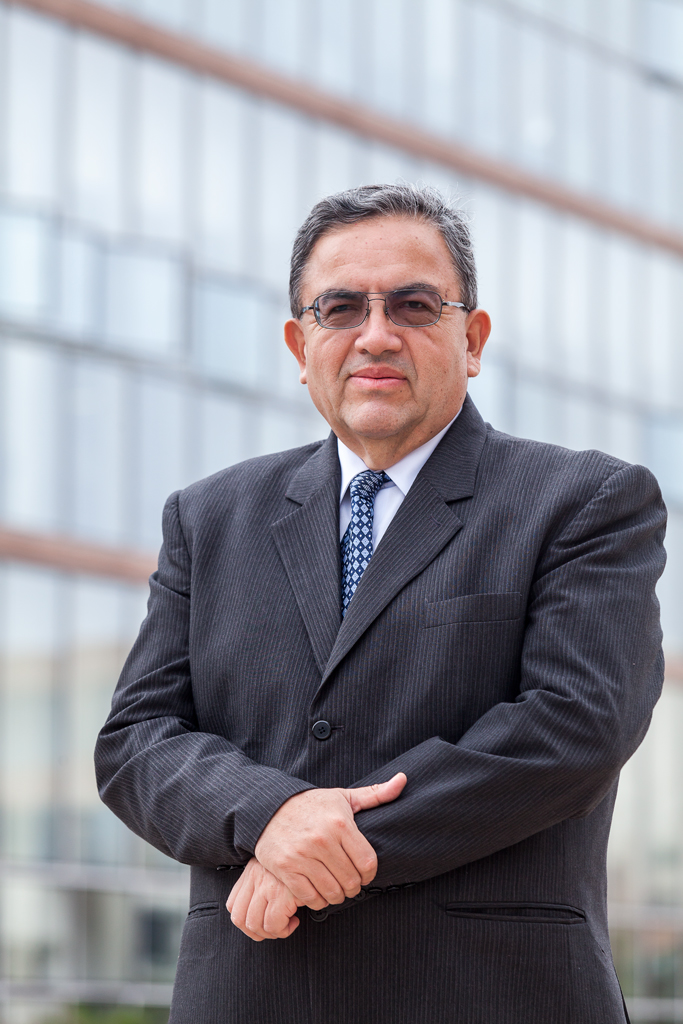
Engineer Miguel Mejía Puente, re-elected as dean of the School of Science and Engineering, provided us with an interview to expose his plans, for 2017-2020 period, of educational management, undergraduate studies, exchange program and international accreditation..
What is proposed for this second period?
This second period is a huge challenge to my administration, since pending issues need to be consolidated. All of this can be summarized in three points: curricular designs, internationalization and association with alumni and companies. Regarding the first issue, the curricular design has to be reviewed, mainly because we are educating professionals the success of which in companies is irrefutable, as dependent employees, but they are not trained to autonomously create own companies. I think at present this aspect is essential to create own enterprises, which may contribute to the country development by creating companies based on specializations. However, the only way to achieve it is by training us, so, we have to incorporate entrepreneurship and innovation courses within the curriculum, once they graduate, they will have necessary command to develop own projects. The power to start own enterprises should not have to be a necessity, but an alternative within a very competitive labor market.
What aspects would you change in the curriculum?
Our main issue is the rigid system that, in most courses, is based on evaluations, practices, exams and laboratory tests. However, there is a few of them where teaching, methodology and evaluations are more flexible, but it is not very representative of what should be sought. Master classes are already a way of majority teaching, it should not be like that, at least, but we have to look for more collaborative methods, where more student participation, team work, etc. is sought. This type of activities must be incorporated into some courses, not in all of them because it would not be possible, as it depends more on the topic, but I think it should be the axis: curriculum flexibilization. Also, incorporating a big number of elective courses, which enable the student, eventually, to decide on a specialization on certain careers; sometimes, there are a lot of mandatory courses and, practically, this defines a type of education, but I think there are careers with some orientations and it is known through the labor market.
At present, many schools and programs choose interdisciplinary courses. Would you look for promoting this type of courses?
Of course, this is a goal, this issue is raised on the strategic plan, interdisciplinarity is sought, but it also depends on professors. We are promoting this issue and we have to set policies for the creation of at least one interdisciplinary course in each School program. At present, it is conditioned by good will of a small number of professors.
Is there any initiative to approach the professors to a better professor training?
The University, over the time, has always have a unit in charge of educational issues, the last one is the University Teaching Institute, but, as I discovered, there are a few professors interested in teaching available courses or resorting to them to improve their teaching process. So, there should be a policy of Academic Vice-president’s Office, which enables this process to be much more natural and important for professors. A possible initiative might be asking the professors to, at least, take a course of the Institute to improve thus their teaching/learning process.
Regarding the exchange programs. How will the School continue to support students?
The School, for three years, has supported students who are giving lectures at international level. We have participated in some countries of Europe, Asia and North America. So, there are spaces where students may participate and always the School will support them. Another significant issue, but difficult to solve, is that, approximately, we have one hundred and fifty students that want to study a semester abroad; however, after approving, satisfactorily, the selection process, not more than ten of them travel; one of the main reasons is that they do not have necessary economic resources for staying six months in another country, both the University and the School are limited for this. Moreover, we ensure that foreign students choose our courses, mainly, those courses given in English; I think this aspect is interesting, interaction with a reality as ours to learn, not only skills, but also, idiosyncrasy and our way of thinking.
What is the status of the accreditation process of careers that still lack accreditation?
In the School, there are scientific majors such as Mathematics, Physics and Chemistry; on the other hand, Engineering and Statistics majors are professionalizing, which seek the alumnus to satisfactorily develop in the labor market. In this universe, accreditation is important, to the extent it gives alumni an opportunity to opt for following graduate studies abroad. For this, accreditation with ABET, of North America, opens a door to several universities. Moreover, we have an accreditation, not only with ICACIT, with whom we already work, but we have some talks with SUNEDU to consolidate future national accreditations and, thus, to have recognition and a point of start.
What actions will be taken by the School to improve student/enterprise relationship?
There is a contradiction, as we promote students to carry out internship, moreover, it is covered in the curriculum, but we can do just a little to make them achieve that. On the other hand, we make all efforts to create an alliance with enterprises and, in many cases they lack interest because of several factors, mainly, of economic nature. In this sense, alumni would be a way to approach enterprises; however, the universe of alumni related to the School is not so big, but we will do efforts to recruit more alumni by inviting them to congresses, to give courses or talks, to organize events, consultancies, everything that may be necessary to promote a link between them.